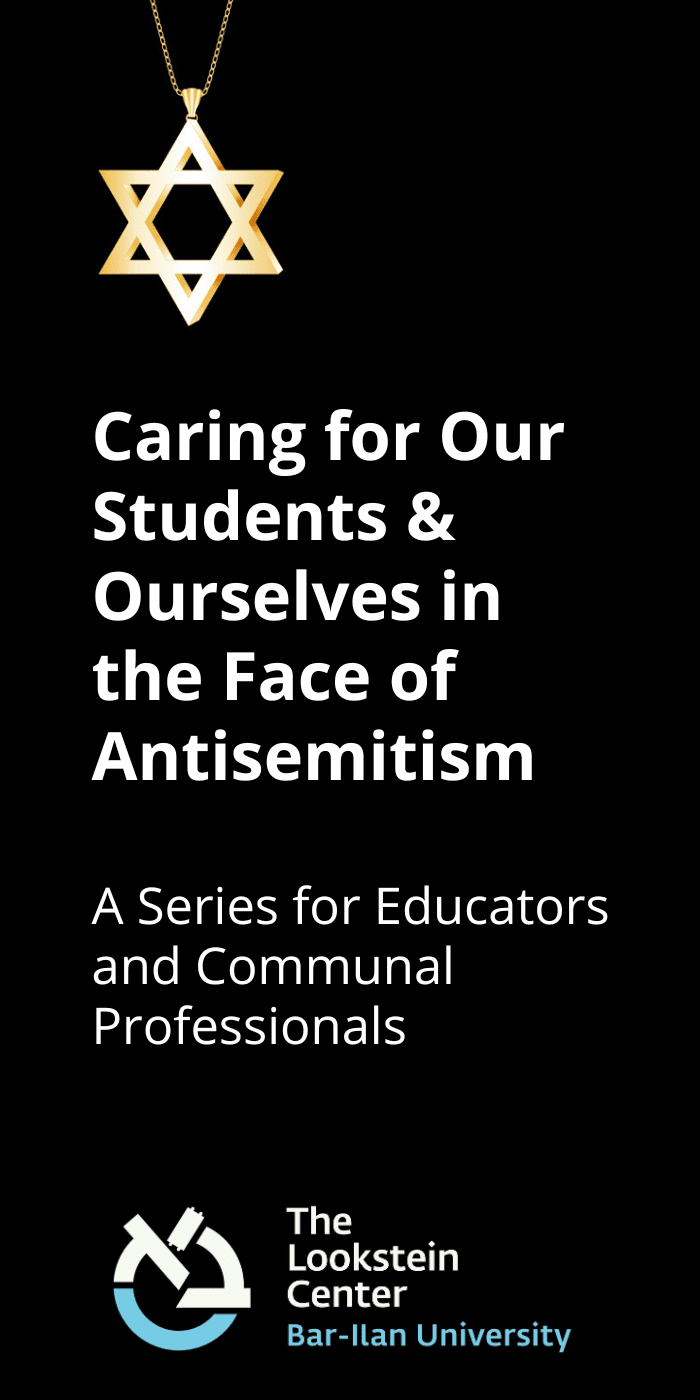Spiritual Deliberations with Ten Year Olds: Cultivating Wonder, Curiosity, and Commitment

Howard Deitcher is a Professor Emeritus and former director at the Melton Centre for Jewish Education at the Hebrew University of Jerusalem. Rabbi Dr. Deitcher serves as the Academic Advisor at the Teacher Institute at the Melton Centre (Hebrew University) and chairs the UnitEd Advisory Committee. He is an executive member of the Israeli Centre for Philosophy for Children and has published numerous articles, and co-edited four books.
Snippets From a Spiritual Deliberation
On a wet and cold Israeli January morning, I was invited to lead a “Spirituality Deliberation” with a group of fourteen fifth-grade students at a National Religious school in Jerusalem. The subject that we addressed was one that was familiar to the children from their daily lives and school curriculum, namely “The Meaning of Miracles.” It was clear throughout the forty-minute session that these kids had much to share with their friends and teachers on this topic. I will begin with snippets from the session, and then present the ideas behind “Spirituality Deliberations” in Jewish school settings.
I opened the session by inviting the students to define their understanding of miracles. Elisheva responded by stating that a miracle is “something amazing that can’t be done by people alone.”
Zev, a bright and freckled-faced youngster, followed up by distinguishing between unusual-event miracles, such as the Splitting of the Sea, and those that we take for granted and do not necessarily pay attention to in our daily lives, such as, “The fact that we wake up in the morning, breathe the air and begin a new day.”
Building on Zev’s thoughts, Amichai added: “Usually we think that a miracle is something great. But it depends on who is experiencing the miracle. In the case of the Splitting of the Sea, it was a miracle for the Jews, but not at all for the Egyptians.”
Amichai’s insightful comment triggered new ideas, comments, and questions.
Following up on the children’s thoughts, I shared four categories that could help us deepen our understanding of miracles. I invited the students to distinguish between:
- Ordinary Events
- Amazing Events
- Miracles
- Coincidences
After briefly exploring these concepts, I asked the kids to decide which of these concepts accurately describes the following Biblical texts:
- The Creation of Man (Genesis 2)
- The Splitting of the Sea (Exodus 15)
- Joseph interpreting Pharaoh’s dreams (Genesis 41)
- Moses being saved by Pharoah’s daughter (Exodus 2)
The ensuing discussion was extremely rich and succeeded in highlighting different perspectives and interpretations. Here are several of the comments that were shared:
In reflecting on Pharoah’s daughter saving Moses, Uri contended that this was “pure coincidence.” He maintained that, “Pharoah’s daughter was just acting in a natural and caring way, and there is no reason to think there was anything unnatural.”
Naama, an outgoing and curious thinker, responded that in fact, the miraculous aspect was “that Moses, the great Jewish leader, was saved as a result. That must be a miracle, for it affects Jewish history to this day.”
We then proceeded to conduct a similar discussion about Joseph’s successful interpretation of Pharoah’s dreams. Scratching his head and raising his voice to emphasize his point, Yonatan argued that “Of course, it was a miracle. This may have saved Joseph’s life, and it certainly allowed him to become second-in-command to Pharoah.”
Avital disagreed and stated that it was an ordinary event. She offered the following analogy: “Some people know things that others don’t. Certain kids have the ability to understand information that others don’t. Does that mean that these kids have the power to make miracles?”
Expanding on Avital’s point, Naama challenged Yonatan’s claim by stating: “But perhaps there is a difference between kids knowing certain things, and kids who can interpret dreams. Interpreting dreams isn’t something you can learn. It’s a skill you are born with.”
Once again, we witnessed the students digging deeper to understand their friends’ statements and to make sense of these claims for themselves.
Toward the end of the session, we returned to our opening question: “What is a miracle?” Most interestingly, the children focused on everyday miracles that they experience.
Asael, a blond and wide-eyed youngster, opened the conversation by saying: “The fact that we have food in our homes and clothes to wear is a miracle.”
Noam jumped in and, drawing on our earlier conversation, added: “If everyone in the world had food, then it would be ordinary, but there are some people who don’t, so us having food to eat is a miracle.”
Then Shai added a new dimension to the conversation. He said, “Even though it seems ordinary, we should still remember that it is a miracle, so we don’t look down on other people as if we are above them.”
This moral educational message was striking, as Shai helped the group appreciate how our sense of miracles can allow us to increase our empathy towards others.
It was most gratifying to note that at the end of the session, the children included some of the language and terms that we had discussed earlier; namely miracles, possible coincidences, and amazing events.
The Power of Spiritual Deliberations
This brief description of a spiritual dialogue with ten-year-old children is meant to underscore:
- The importance of initiating conversations with youngsters about critical spiritual issues in their lives.
- Their inherent eagerness to share their thoughts.
- How this technique can be seamlessly integrated into the formal Jewish studies curriculum.
The overall goal of this article is to share the children’s creative and nuanced understanding of spiritual issues, thereby encouraging teachers to engage with their students in a critical journey that will shape their lives and those of their families. For the purposes of this article, we will not delve into the significant differences between spirituality and religious or theological thinking. This educational approach can be adapted for all of the above.
The rest of this paper will shed light on the power and potential of spiritual education for children by adopting the “philosophy for children” approach, which engages youngsters in active deliberation on issues relevant to their lives. As demonstrated above, holding spiritual deliberations is a potential goldmine for Jewish education. This is evidenced by the children’s eagerness to explore the issues and interact with their peers, and the skillful way that they express themselves with clarity and nuance.
Why Engage in Spiritual Deliberations?
In recent years, there has been a marked surge of interest in young children’s spiritual development and its impact on shaping their religious, moral, and social worlds. In Jewish education, several studies have noted the glaring absence of structured theological and spiritual education programs, and how this deprives students of a significant formative experience.
Over the past three decades, researchers have studied the impact of Spiritual Deliberations on children of various ages. Some of the striking noted benefits of these dialogues include:
- Offering students key skills and knowledge to engage with spiritual issues in an open and supportive environment, thereby fostering their ongoing growth and development.
- Facilitating students’ ability to formulate and articulate their personal viewpoints on meaningful issues in their lives.
- Fostering careful listening skills, thereby encouraging students to ponder their peers’ ideas and opinions.
- Sharpening students’ ability to pose thoughtful questions in respectful and constructive ways, thereby honing their critical thinking skills.
- Learning to continuously reflect on their stated beliefs and opinions by responding to their friends’ questions.
How to Lead Spiritual Dialogues
Oftentimes, spiritual education is practiced via a top-down “passing on” of certain accepted truths. Yet many day school students and their families do not respond positively to this approach. In fact, it frequently alienates them and discourages them from actively engaging in meaningful dialogue.
We suggest adopting a process of “acquisition” instead, where the bulk of the work is done by the students. In this model, students are active participants in exploring spiritual meaning in their lives. They learn through the collaborative process of sharing their ideas and listening carefully to their peers, whose sometimes-opposing positions may generate new thoughts and insights.
A common way of launching a deliberation is to have the group examine a text (as we did above). However, art forms, digital images, or music selections can also be used as triggers. The discussion unfolds by encouraging the students to share their thoughts and inviting their peers to add questions and comments.
We generally recommend holding monthly deliberations. During the weeks leading up to the deliberation, we create a Google Doc in which children are invited to submit personally relevant spiritual topics that they would like to discuss, and a sentence or two explaining why this topic resonates with them. Several days before the deliberation, the students vote on which topic is most interesting for them. The winning topic is selected for the deliberation.
The Teacher’s Role
The teacher plays a critical role in this process. Her role is not to hand down truths from on high, but to assist the children in identifying and forming their own beliefs and feelings. A helpful metaphor is that of a midwife. The midwife serves as a supporter, a facilitator, and a guide. In the same vein, the teacher helps the students flesh out their questions and ideas. The teacher must operate out of the belief that relatively young children are capable of analyzing spiritual ideas in mature and sophisticated ways. She must also believe that children’s ideas are to be recognized and valued as legitimate. Finally, she must ensure that the classroom is an emotionally safe place for children to share their thoughts and feelings.
The children must be allowed and encouraged to have their own opinions and they are the only ones with the right to state their viewpoints. The teacher merely facilitates the discussion. She must have faith in the students that they are capable of analyzing the subject and coming to meaningful conclusions on their own without being spoon-fed the “right answers.” However, an intrinsic part of the process is also gently encouraging the children to question and examine their peers’ statements. This give-and-take encourages children to re-evaluate their statements and to think through and possibly revise their positions.
One critical way that the teacher does this is by posing “midwife questions.” Examples of appropriate midwife questions might include:
- What exactly do you mean by that?
- Offering a reflective re-statement: “What I heard you say was…”
- What are you presupposing?
- Are there reasons to possibly doubt this?
- What are the implications and consequences of your position?
- Does anyone have a different perspective on this?
In Conclusion
After having conducted a series of spiritual deliberations with school-aged children, I am keen to share the following observations:
- If we select a topic that is relevant and meaningful for the students, they respond with a remarkable level of enthusiasm and excitement.
- When the deliberations are structured appropriately, the kids listen carefully to their friends’ comments, ask for clarification, and then integrate their friend’s comments into their own.
- While studying new Jewish texts, the students often adopt some of the language, ideas, and concepts that they encountered in the deliberations.
- Sometimes parents report that the kids continued these deliberations at home with their family and friends, and this generated much interest and involvement.
- The children shared how important it was for them to hear from their teachers and friends responses like: “I don’t yet know the answer to that question,” or, “I realized that in light of the deliberation, I want to reconsider my opinion.”
When children’s peers, and especially their teachers, are willing to honestly admit that they do not have all the answers and that they have what to learn from the children, this transforms the students from a passive and often uninterested captive audience into active, motivated, equal partners in exploring spirituality together with their friends and teachers. The key to all of this is validating the students’ opinions, and their right to have an opinion on spiritual and theological topics. We believe that this approach contributes a critical role to the children’s growth and development.
Finally, introducing spiritual deliberations into the Jewish studies curriculum opens new windows of learning that can enrich the children’s lives in multiple ways. Inviting our students to actively engage in these conversations can help them wrestle with essential spiritual issues, and show them that they have the ability to figure it out on their own. This encourages and enables their ongoing spiritual growth and development.



Howard Deitcher is a Professor Emeritus and former director at the Melton Centre for Jewish Education at the Hebrew University of Jerusalem. Rabbi Dr. Deitcher serves as the Academic Advisor at the Teacher Institute at the Melton Centre (Hebrew University) and chairs the UnitEd Advisory Committee. He is an executive member of the Israeli Centre for Philosophy for Children and has published numerous articles, and co-edited four books.
Reach 10,000 Jewish educational professionals. Advertise in the upcoming issue of Jewish Educational Leadership.




